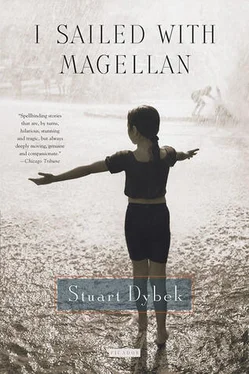His name was the last thing he taught Mick.
“Di qué tú quieres?” the gang banger asks again.
That the question is oddly formal and more insistent—“Say what you want”—is not lost on my brother. German and Spanish were his double major before he dropped out of Memphis State. Years ago he lived briefly in Mexico, just before the FBI caught up with him in New Orleans for draft evasion. Mick has an ear for languages. He doesn’t dream in Spanish but does lapse into it when he gets drunk. One of Mick’s many theories is that the fastest way to learn a language is to live with a woman who speaks it. “Of course,” he concedes, “your vocabulary will be a little skewed.”
Besides Spanish he speaks a bit of German, Cambodian, Italian, French, Portuguese, Haitian Creole, Polish, Chinese. Not that he’s learned all those from women — our father spoke Polish, and in the restaurants where Mick has been employed for most of his working life English is often a second language.
He got involved with theater by following a woman. She was strikingly beautiful, Mick said, her hair glowed with a sheen he’d seen before only on race horses. He saw her on a street in New Orleans and the song “Tennessee Stud,” with its chorus “The Tennessee stud was long and lean, The color of the sun and his eyes were green” popped into his mind. Humming the song, he followed her for blocks into the Garden District, to a bar where actors had gathered for an audition in the back room. When Mick followed her in, they thought he’d come to try out for The Glass Menagerie. Playing along, he read for the part of the narrator, Tom Wingfield, from the play’s opening speech: “Yes I have tricks in my pocket, I have things up my sleeve. But I am the opposite of a stage magician. He gives you illusion that has the appearance of truth. I give you the truth in the pleasant guise of illusion …”
Mick had read only to the line “In memory everything seems to happen to music” when the director gave him the lead.
“What about the Tennessee mare you followed?” I asked.
“She was a beauty, but I’m afraid she couldn’t say ‘Pass the bread,’” Mick said. “Got sent home in tears without a part.”
Over the next four years Mick played leading roles at most of the theaters in New Orleans, until he felt there were no challenges left there. Local theater didn’t pay the bills, and Mick, who was waiting tables, had never saved a cent, but he managed to put away enough for a one-way bus ticket to New York, and to stake himself for the month he figured it would take to get resettled.
It was winter when he left for New York; he’d forgotten what real winter was like. He was crashing in the one-room flat of an old activist friend on Mott Street and running out of money fast. One night, half frozen as he aimlessly explored the city, he wandered into the Kit Kat, a strip bar off Forty-second Street, and saw Mirza dancing topless before a blue foil curtain on a lilaclit stage. She was dusted in glitter, and the lighting seemed appliquéd to her muscular body. Instead of disco, she was dancing — writhing — to Coltrane’s A Love Supreme. If she’d been stripping to the “Ave Maria” it wouldn’t have seemed more sacrilegious to Mick. He watched spellbound, the sinuous supplication of Coltrane’s tenor sax aching along the byways of Mick’s body, and suddenly he understood that, in this glitzy low-life bar, her dance was daring to preach something beautiful and so, inescapably, something spiritual as well. Before the night was over, Mick, claiming he was a prize fighter, had talked himself into a job as a bouncer at the Kit Kat Lounge.
My brother is a middleweight, not the typical bouncer build, but he’d actually had a few semipro fights in New Orleans and been coached by Willie Pastrano, the onetime light heavyweight champ. In a way, it was Pastrano who was responsible for Mick’s moving to New York. Theater types had repeatedly told Mick that New York was where he needed to go if he wanted a real acting career, and that his vague physical resemblance to James Dean was something he could cash in on. But he didn’t buy it until Willie Pastrano said, “Mick, I can’t keep training you unless you make the decision to turn pro. Think it over, because people will pay to see a white kid who looks like that dead fuckup actor James Whatshisface.” That was the permission — the omen — to start anew as Jimmy Delacroix, to move to New York in the dead of winter and enroll in the Actors Studio, where Brando, Montgomery Clift, and James Dean had studied with Lee Strasberg.
“Qué quieres?”
The Disciple removes his sunglasses as if for emphasis, then rises to his feet like someone tired of sitting, in need of a stretch. He’s a handsome kid with a shadow of mustache, and now that he’s removed his sunglasses, Mick notices that what he took to be a mole on the kid’s cheekbone at the corner of one eye is a tattooed blue tear. The tear, Mick knows, is a tribute to a gang buddy who was killed. Every kid in this gang-graffitied neighborhood could probably be crying the same blue tear.
“ Qué quieres, hombre?” Whataya want, man? the kid asks for what must be the fifth or sixth time. Now that he’s on his feet, it’s clear he has no intention of sitting back down.
“I grew up here, too. I thought I’d come back to see if the old place was still standing,” Mick answers in Spanish, and smiles. In New York, the surprise of a blond-haired, blue-eyed guy speaking rapid-fire street Spanish usually eases the reflexive hostility. In the Bronx neighborhood of his santero, Mick is known as the jibaro rubio, the blond hillbilly. But here, no one smiles back. Before Mick can continue explaining, the kid repeats the question.
“Qué quieres?”
We were at the Village Vanguard on Saturday, the second night of my visit to New York, when Mick told me the story of how he’d moved from New Orleans. We’d gone to hear Gato Barbieri, an Argentinean sax player with a tone like the screak of some great tropical bird. On the Vanguard’s stage, a stage that seemed too cramped for the club’s legendary stature, Barbieri soared in ecstatic flurries above a joyful racket of drumskins, maracas, and a berimbau. Between sets, Mick chain-smoked and chain-talked. He kept offering me cigarettes, and I kept telling him I’d quit. Finally, he observed that quitting must have agreed with me as I was looking fit, then insisted we arm-wrestle for drinks even though he could wrestle only with his weaker left arm. His right elbow was still healing from a break that had required surgery. Since I’m left-handed, it wasn’t a fair match.
“How’d you ever get them to hire your Yimmy Delabaloney ass as a bouncer?” I kidded, after pinning him a few times.
“I simply told them the truth, that the job of bouncer demands psychology, not brute strength. Being a bouncer is about acting.”
It was another of Mick’s ever-fomenting theories that life was essentially about playing roles. It seemed a dangerous idea to put to the test if the role was that of bouncer on Forty-second Street.
His elbow was injured outside the Kit Kat when he was stomped in a brawl he didn’t see coming with a party of crazed UFO conventioneers — some dressed like Star Trek characters. “Wouldn’t think Trekkies could be such mean fucks,” Mick said. “Whatever happened to ‘Live long and prosper’?”
After the cops broke up the fight, Mick went back into the Kit Kat and began pounding shots of Barbancourt rum. A Haitian friend had once told him there was a saying in Haiti that “Barbancourt can cure even peg leg.” Mick couldn’t bend his right arm, and the bad timing of the injury was ominous: his first real audition since arriving in New York was scheduled for the next morning. He was to read for a role in Tennessee Williams’s Summer and Smoke, a play he had done in New Orleans. He’d long regarded Williams as his lucky playwright, and luck was something Mick increasingly courted. He’d become superstitious since moving to New York, addicted to lotto — a game he’d previously condemned for bilking the poor. You couldn’t pursue a career in acting, he now argued, without accepting that your life would be governed by chance.
Читать дальше












